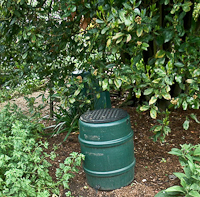|
 Of course, there are several criteria
for selecting the "ideal" site for a compost pile. We will list them
below but the reality is that most of us will have a limited set of
options. If you live in an urban or suburban site and do not have
acreage, you will just have to try to make it fit as many of the
criteria as possible in your limited space. Of course, there are several criteria
for selecting the "ideal" site for a compost pile. We will list them
below but the reality is that most of us will have a limited set of
options. If you live in an urban or suburban site and do not have
acreage, you will just have to try to make it fit as many of the
criteria as possible in your limited space.
-
Sun - This is a case of too little or too much. If the
pile is in full sunlight, it will warm up quicker but it will
also dry out faster. In heavy shade, the pile will stay cool and
moist but the organisms will not work very hard. So, the ideal
site might be one that is under deciduous trees with a high
canopy of shade. This will allow the pile to heat up and will
not lose moisture too fast. In the winter when the leaves are
off the trees, the sun can warm the pile a bit even on cold
days.
-
Drainage - The site needs to be well drained and should
not be in a low lying part of the landscape where water
accumulates after rain storms. The ground beneath the pile
should be as level as possible to avoid excess water from
running down hill toward neighbor's yards.
-
Space - There needs to be enough room for at least the
minimum size container which is 3 feet wide by 3 feet high by 3
feet deep. Also, remember that you have to be able to turn the
pile, bring plant material to the pile and take compost away.
-
Water Supply - To maintain the proper water balance, you
will need easy access to a water supply. Of course, this may be
at the end of a hose but you will need some easy way to add
water periodically as needed.
-
Camouflage - Generally, you and your neighbors will not
relish the idea of having to look at your compost area.
Actually, you might not mind, so you need to find a way to
screen the area from view. This can be done with fencing or
shrubs or a hedge or a structure or something to keep it out of
sight.
|



